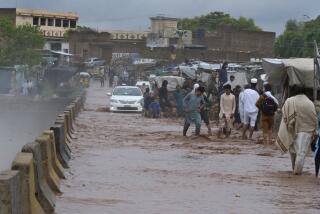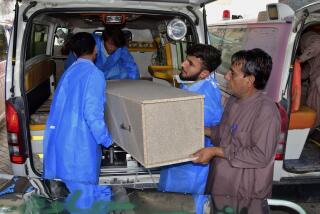Bomb blast in southwest Pakistan kills at least 65
ISLAMABAD, Pakistan — A bomb blast killed at least 65 people in the southwest city of Quetta on Saturday in what appeared to be the latest episode of sectarian violence against the country’s beleaguered Shiite Muslim minority.
The explosion occurred near a market crowded with shoppers in a Shiite-dominated neighborhood, local and federal government officials said. Authorities believe the blast was caused by a remote-controlled bomb planted in a water tanker. Women and children were among the dead, police said, and at least 175 more people were injured, some of them critically.
[Updated at 9:39 a.m., Feb. 16: This post has been updated to reflect a rise in the death toll from 50 to 65, and an increase in the number of wounded to 175. In addition, the parked vehicle in which the bomb exploded has been identified as a water tanker.]
No one immediately claimed responsibility for the attack. Shiites angrily protested the bombing, burning tires on the street and hurling stones at passing police vehicles. Shiite leaders called on members of the sect to launch a strike in Quetta on Sunday.
For years Sunni Muslim extremist groups have targeted Shiites in Pakistan, including the Shiite-dominated Hazara community of Baluchistan province in the country’s southwest, where Quetta is located. Sunni militant groups regard Shiites as heretics, and have pursued a campaign of violence against them.
In 2012, more than 400 Shiite Muslims in Pakistan were killed in sectarian attacks, according to Human Rights Watch. More than 120 of those killings took place in Baluchistan.
The violence intensified earlier this year, when twin suicide bomb blasts at a billiards hall in a Shiite neighborhood in Quetta in January resulted in more than 90 deaths and 160 injuries. Lashkar-e-Jhangvi, a Sunni militant group, claimed responsibility for that attack.
Afterward, relatives of those killed in the attacks carried out a sit-in protest for several days on a Quetta roadway alongside dozens of coffins carrying the remains of the victims. Under Islamic tradition, the dead should be buried as quickly as possible. Shiite Muslims ended the protests only after Prime Minister Raja Pervez Ashraf agreed to dismiss the provincial government and turn over all governing power to the governor, who is appointed by the federal government. Ashraf also ordered the deployment of paramilitary troops to hunt down militants responsible the bombings.
ALSO:
Hundreds injured by meteor explosion in Russia
Venezuela releases first photos of Hugo Chavez after surgery
‘Blade Runner’ Oscar Pistorius weeps as he faces murder charge
More to Read
Start your day right
Sign up for Essential California for news, features and recommendations from the L.A. Times and beyond in your inbox six days a week.
You may occasionally receive promotional content from the Los Angeles Times.






